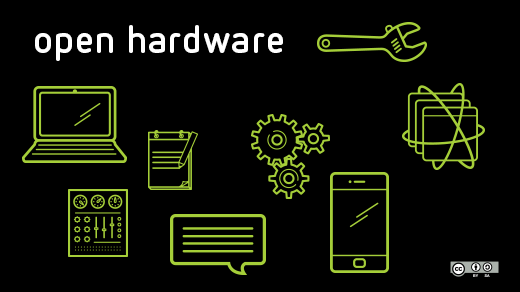Your friends are going on about Arduino, you know that Raspberry Pi isn't actually a baked good filled with fruit, and you've been following along with Open Hardware Week. But where do you start? How do you teach yourself the basics?
Here are some great starter projects for beginners, ranging from simple electronics projects involving batteries and tape to open source beehives.
LED throwies, swimmies, and floaties
Everyone loves light-emitting diodes, and they form the basis for one of the easiest home electronics projects out there: LED throwies. With some cheap components, a watch battery, a magnet, and some electrical tape, you're on your way to making a bright, throwable widget that sticks to any magnetic surface. And once you master the art of the simple throwie, try stepping it up a notch with some extreme throwies with on-off tabs and waterproof containers.
Chapstick LED flashlight

The throwie is easy, but let's break out the solder gun and make something really useful. With an empty tube of lip balm and some additional components, you can create a working flashlight that fits in even the smallest of pockets. This project requires some specialized parts, like a battery holder and a switch, but they're all parts you can find easily online or at your local electronics store.
Conductive Putty
In some cases, hardware can be pretty soft. Grab your favorite electrical components—LEDs, buzzers, switches, and wire—and whip up some conductive and non-conductive putty. Stick the parts to the putty and see what happens.
This is a great project for parents who want to introduce their kids to electronics, and it forms a great basis for foundational concepts like "in series" and "in sequence" for circuits. Plus, it's just fun to play around with. Find more open hardware projects for kids.
LED planetarium

By Instructables user mattthegamer463
So you know your anodes from your cathodes, and you're ready to graduate to the next level of LED fun? How about a planetarium? Instead of heading to the store and buying a pre-made hunk of plastic, try your hand at making your own. Take a metal bowl, punch some holes in it (bonus points if your starscape is accurate), and hook it up to some batteries. No soldering is required, but you'll have to get out some powertools if you want to make things easy on yourself.
Open Source Beehives
Do bees dream of electric beehives? Was Deckard a replicant? Some questions will never be answered, but the Open Source Beehive project is aiming to answer the question of colony collapse disorder. They've started a crowdfunding campaign to raise funds and awareness, and to get laser-cut and printed beehives into the yards of budding beekeepers everywhere. They're also developing open source hardware and software to help track the health of bees in these hives. Back the project and by this time next year, you could be tracking your own colony of bees in your backyard with a brand new beehive, and reaping the rewards of sweet, sweet honey.
So, now that you have a few projects to inspire you, what are you waiting for? Get to your local electronics store, fire up your soldering iron, and get cracking. And don't forget to share your own favorite open hardware projects in the comments below.
View the complete collection of Open Hardware Week articles.








4 Comments